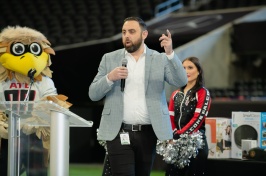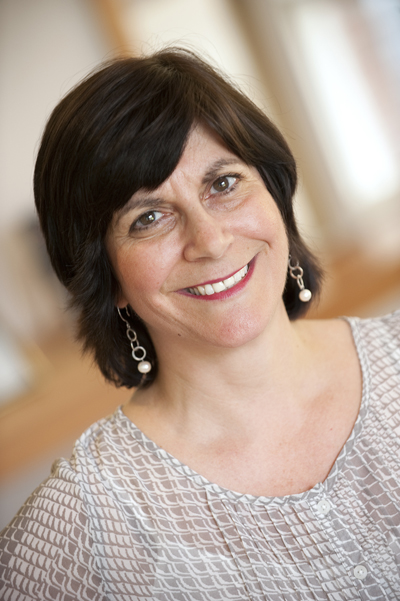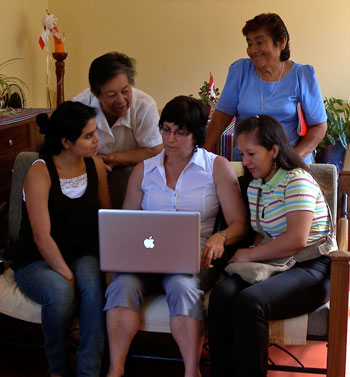|
Lina Bowden ’G12 earned her master of arts degree in development policy and practice. LEARN MORE >> |
Lina Bowden came to UNH because she had a vision for working in the development field. Her inspiration came from her volunteer work in a very poor neighborhood in Chiclayo, Peru, a city of about 630,000 people. Specifically, she wanted to work with the women who run the Santa Angela Center. For more than 20 years, they have led the way in numerous civic and community development initiatives in Chiclayo.
When Bowden approached them about working together on a project, the women of the center already had something in mind.
Their dream was to open a restaurant that would also serve as a culinary skills development center for about 25 young women and men ages 17 to 24 each year. It would also serve low-cost traditional meals, support local growers, and promote community events for local musicians and artisans. This new center could help change the lives of a young generation in their neighborhood.
With 30 years in the financial industry in Canada, Bowden, an accountant, had successfully held senior positions for the better part of her career and helped to build an investment firm. Initially, she wasn’t sure that a master’s degree would be possible, but she was ready to change careers. As Bowden did her research, she learned about the UNH master’s degree in development policy and practice (MADPP).
“Because the program is flexible—a combination of low residency and online coursework—I could actually do it,” Bowden emphasizes.
The tipping factor for Bowden was the chance to work and study with other practitioners. “I really wanted to bring a full tool kit to my work in Peru and my future development career,” Bowden notes. “Through this program, I’ve been able to take courses in global health, sustainable agriculture and food systems, the environment, and social enterprise. I’ve also been able to learn from people who really know what it’s like to work in the field. Plus, my fellow students are wonderful, and they will be my support network after I complete this degree.”
The Logic Model
The MADPP degree requires that each student works on an applied field project. Students learn to design, plan for, implement, monitor, and, if time and resources permit, evaluate their field project via a four-part management course series. Central to this series is the Logic Model.
The Logic Model is more than a business plan. It is an outcomes-based approach that reflects the project’s “theory of change.”
In order to ensure that the project responds to real community need, the student practitioner must put in tremendous amounts of research and analysis up front. It’s about seeing the big picture and integrating the community into the process.
|
At the Santa Angela Center in Chiclayo, Peru, Lina Bowden (center) meets with the leadership team. Courtesy photo. |
“Without this model for our project, we might have begun without properly understanding the needs of the youth and the causes and effects of underemployment in the region,” Bowden says. “I talked a lot with the women in the center and the youth, conducting research that included interviews and focus groups. And Jolan Rivera, who acts as our adviser throughout the master’s degree program, was an amazing mentor.”
The Logic Model means that the most difficult questions do not get overlooked. One method, of course, is the SWOT analysis, which is a systematic look at the project’s strengths, weaknesses, opportunities, and threats. For example, Bowden’s project lists as an opportunity the unique architecture in the civic square. The threats she lists highlight many risks inherent to the third world—environmental pollution, poor water quality, and possible epidemics. In a community with few amenities and many dirt-floor homes, these are real concerns.
Another method looks at outcomes, assumptions, and the possibility of failed assumptions. For example, the project assumes that the community has a commitment to their neighborhoods and that they will invest their energy in this project. But, what if no one comes to the restaurant? And further, after years of unstable, seasonal employment, can the training be effective to develop both the technical and the people skills necessary to run a restaurant?
Bowden’s due diligence suggested the project was a good bet.
Step by step
Soon into her project, Bowden and the team wrote a successful grant proposal to the center’s primary funder, Chatham Ursuline Charities. With funding sufficient for the next three years, they could begin, systematically to work toward their goals. One—the project team will establish a restaurant in the civic square by September 2012. In its second year, the restaurant will begin a youth training program in restaurant management. And, in its third year, the center hopes that the project will be self-sustaining.
As part of the project’s Logic Model, their evaluation indicators include monthly revenues generated by April 30, 2014, number of youth who complete the program, and finally, number of youth who acquire stable employment and improve their standard of living.
When Bowden reflects on this project just as it begins to take flight, her first thought is probably the same as the women of the Santa Angela Center: Will this project make a difference for these young people?
Co-coordinator of the Santa Angela Center Erla Hoyos shares: “… in asking our youth about this idea, we heard great support for it. Many want to be given this chance to be trained. Even before we begin the training program, we will have provided employment for four young people from our neighborhood who are going to be trained to manage the restaurant and facilitate the training.”
As someone who will continue with this work perhaps in other Latin American countries, Bowden has learned and experienced the value of the caring and inclusive leadership of the Santa Angela Center. She especially notes that they always look outward to their community rather than too much inside their organization.
And finally, as a financial person, she underscores the need for patience in regards to launching social enterprises and seeking sustainability. By managing expectations, “the financial goals of the organization [need not] deflate the original mission’s focus.”
Originally published by:
UNH Today
Written by Carrie Sherman, Editorial and Creative Services. Photo by Perry Smith, UNH Photographic Services.



















































